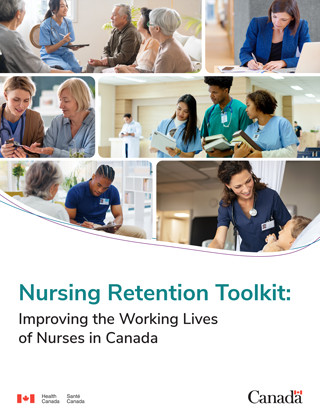In March 2024, Dr. Leigh Chapman (PhD 19’) federal Chief Nursing Officer, launched Canada’s first ever Nursing Retention Toolkit to help address the significant challenges posed by nursing retention across the country.
The toolkit is a necessary and strategic framework, built through thoughtful pan-Canadian collaboration with a diverse group of nursing experts, including nurses at the point of care, nurse employers, decision makers, nurse regulators, union representatives, nursing students and others. The fundamental reasoning behind the creation of the toolkit is to improve the working conditions of nurses across Canada and keep then in their job and the profession; it was of utmost importance to involve key individuals in its development who are committed to same. Targeted at employers, organizations, health systems, as well as health systems administrators, the toolkit provides practical strategies and resources to improve nursing retention and is centered on eight core themes.
“This resource was created by nurses, for nurses. My hope is that it will spark change in how we think about and value nursing work and build on the work others have done, to improve nursing retention in Canada,” says Chapman who is also an alumna of the Lawrence Bloomberg Faculty of Nursing.
Since she was first appointed to the role of CNO in August 2022, Chapman has made it one of her primary goals to address the significant and increasingly complex challenges of retention in the nursing workforce by engaging nurses from coast to coast to coast and hearing from them directly about what is needed to improve the working lives of nurses.
According to Chapman, increasing violence and discrimination towards nurses, as well as high patient volumes and acuity, are leading to moral distress which, among other factors, are causing many nurses to leave the profession.
“Nurses are critical in providing high quality care, but the challenges and stress they are facing daily at work is leading to an exodus that we cannot sustain. For nurses to stay, we must support them in their everyday work,” says Chapman.
The eight themes outlined in the toolkit are underpinned by the values of respect, anti-racism, anti-oppression, transparency and accountability. These core themes are:
- Inspired leadership;
- Flexible and balanced ways of working;
- Organizational mental health and wellness supports;
- Professional development and mentorship;
- Reduced administrative burden;
- Strong management and communication;
- Clinical governance and infrastructure; and
- Safe staffing practices.
For each of the themes, initiatives are also included as a guide for employers and organizations to implement as strategies that target retention. Initiatives that fall under the theme of organizational mental health and wellness supports include:
- Zero Tolerance for Violence, Bullying, and Racism,
- Moral Distress and Injury Care, and
- Best Practices for Vacation and Time Off.
Other initiatives under the other themes focus on issues such as work re-design, digital preparedness, nursing shared governance, mentorship programs, and safe staffing framework tools to name a few.

Nursing students are one of the key groups that the toolkit aims to support. Their voices and unique perspectives, as the future of the profession, are crucial, Chapman says, to ensuring positive change is achieved within the health system.
Chapman recently presented the new toolkit to students in Bloomberg Nursing’s Centre for Professional Development’s Certificate Course on Leadership & Management. The focus of this presentation was on the front-line Nurse Manager’s role in implementing the newly announced toolkit, with the students given an assignment to look at current health professional retention strategies in their own organizations.
Mentorship for students as they transition into the nursing workforce is immensely important. Within the toolkit, employers will find examples of initiatives that have been implemented to help integrate new nurses into the workplace environment and to ensure novice nurses are adequately supported for a successful nursing career.
“Nursing students are our future leaders,” says Chapman. “We must harness the passion, drive, and leadership skills students and new graduates have because these will be the driving force behind advancing the profession.”
